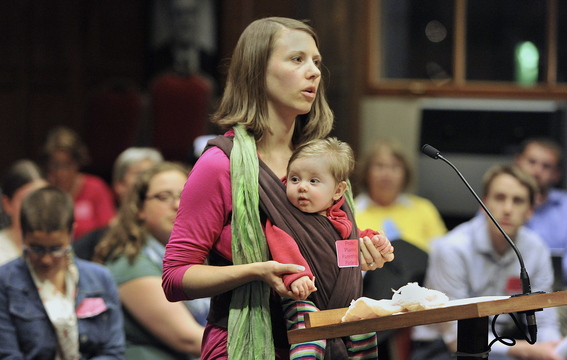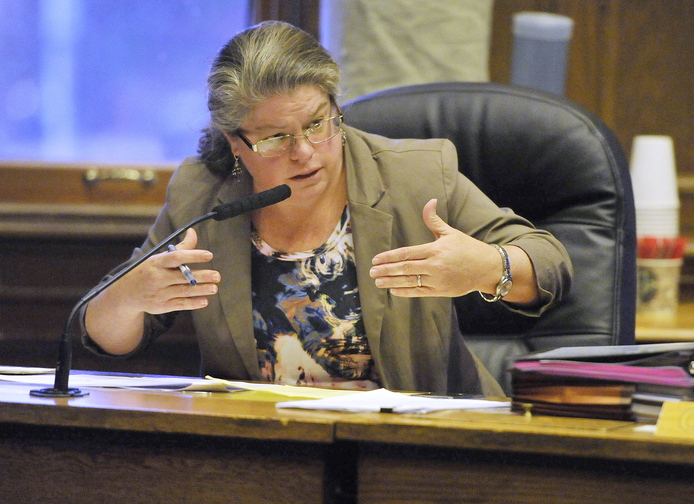PORTLAND — Wearing colorful shirts and pink stickers, supporters of Planned Parenthood of Northern New England filled the council chamber at City Hall on Tuesday night to plead for the city to create a buffer zone around the clinic on Congress Street that has become a target for boisterous anti-abortion protesters.
During more than an hour of public testimony, patients of the clinic described being harassed, intimidated and threatened by protesters who hold signs showing aborted fetuses and shout Bible verses at them. Planned Parenthood’s staff talked about sleepless nights spent wondering about the intensity of the coming days’ protests, and about fearful patients not showing up for appointments.
After hearing from more than 40 people who support the buffer and from no opponents, the City Council’s Public Safety, Health and Human Services Committee voted unanimously to recommend a 39-foot buffer zone around the three entrances to Planned Parenthood, effectively banning protesters from the adjacent sidewalks on Congress and Elm streets.
The proposal will go to the council for a final vote, tentatively on Nov. 18.
“For me, quite simply, the focus of the debate is all about respecting individual rights,” said City Councilor and committee member Cheryl Leeman. “From where I sit, those rights extend to the public and protesters.”
Although no one spoke against the buffer zone at Tuesday’s hearing, two organizers of the protests, Leslie Sneddon of Richmond and Donna Hebert of Waterboro, have said they will sue the city if the buffer is enacted. Neither one could be reached after Tuesday’s meeting to say what they will do next.
For about a year, 10 to 25 anti-abortion protesters, including children, have gathered regularly in front of Planned Parenthood’s Congress Street entrance, some holding large signs showing graphic photos of aborted fetuses. Some shout Bible verses at women and call them murderers as they enter the building.
Soon after the protests started, Planned Parenthood hired police officers to ensure that the protests did not get out of control. The clinic also has greeters in brightly colored vests to help patients navigate the crowds.
Police have reported no arrests stemming from the protests.
Planned Parenthood has been collecting testimonials from patients who have said they felt threatened and harassed by protesters. Nearly 200 had been collected as of Tuesday, said Eric Covey, the Maine grass-roots organizer for Planned Parenthood of Northern New England.
Although the protesters are not breaking any laws, their words can have a profound effect on women in crisis, speakers said Tuesday night.
Speakers said protesters take photos and videos of the staff and patients, and post them on their Facebook page.
“I have seen their aggressive intimidation tactics firsthand,” said Maria Settler, a clinic volunteer who said she was called a “death-scort” by protesters. “Every weekend, I watch people’s rights be violated. Our sidewalks should not be hostile environments.”
Lynne Schmidt of Norway said she had an abortion two years ago in Virginia. Protesters tried to convince her not to go through with it.
Schmidt, who helps operate an online chat room about abortion, said that if she had been subjected to the vitriol of the Portland protesters, she would have committed suicide.
“I already had these voices in my head,” she said. “I would have found my dog a new home and jumped off a bridge near my house or slit my wrists, which are already scarred.”
Maryalice Walker of Gray, a nursing student at the University of Southern Maine, volunteers at Planned Parenthood’s Biddeford office. In the past six months, she said, anti-abortion protests there have grown more intense.
“This ordinance will set a precedent for the rest of the state,” Walker said. “One patient cowering against the wall in tears is one too many.”
Supporters of the buffer Tuesday included statewide groups such as the Family Planning Association of Maine and the Maine Women’s Lobby, and independent gubernatorial candidate Eliot Cutler, a Cape Elizabeth resident.
Cutler said that if he is elected governor, he will ask the Legislature to enact buffer zones around abortion clinics statewide.
“This just isn’t about Portland. It’s a matter of statewide importance,” Cutler said. “I feel deeply and strongly about this issue.”
The committee had held two meetings about the proposed buffer before Tuesday’s public hearing. Committee Chairman Edward Suslovic noted the need for the city to build an “impenetrable public record” in the likely event the city gets sued.
An issue did arise about whether the buffer could apply to the building entrance at Congress and Elm streets. That entrance is used primarily by the Portland Chamber of Commerce, which is closed on Saturdays.
The city’s neighborhood prosecutor, Trish McAllister, who staffs the committee, said that entrance would be covered since Planned Parenthood can be accessed from that door.
“I’m willing to defend this,” McAllister said.
“That’s good enough for me,” Suslovic replied.
After the vote, the crowd — including older women wearing bright yellow T-shirts saying “GRR: Grandmothers for reproductive rights” — erupted in cheers.
Randy Billings can be contacted at 791-6346 or at:rbillings@pressherald.com Twitter: @randybillings
Send questions/comments to the editors.






Success. Please wait for the page to reload. If the page does not reload within 5 seconds, please refresh the page.
Enter your email and password to access comments.
Hi, to comment on stories you must . This profile is in addition to your subscription and website login.
Already have a commenting profile? .
Invalid username/password.
Please check your email to confirm and complete your registration.
Only subscribers are eligible to post comments. Please subscribe or login first for digital access. Here’s why.
Use the form below to reset your password. When you've submitted your account email, we will send an email with a reset code.